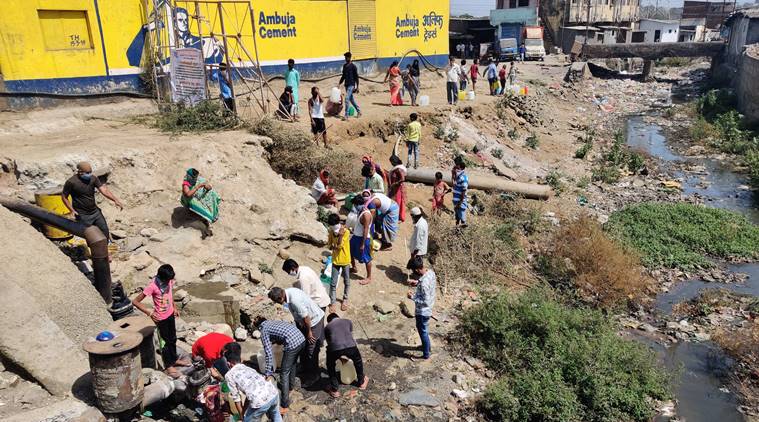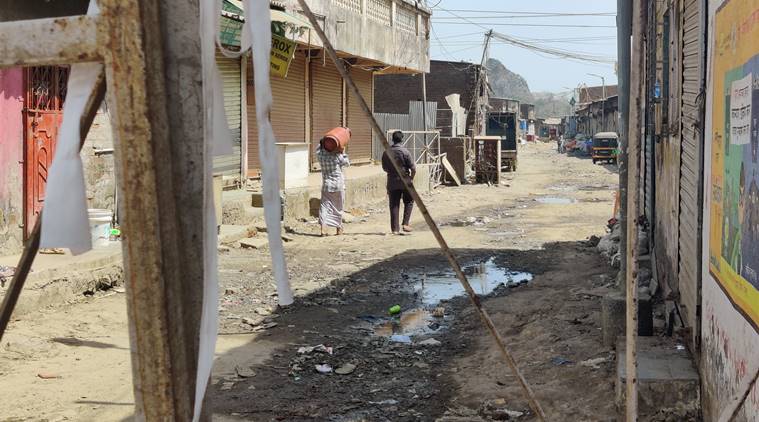Now, contact-tracing health workers are fighting rumours in the area that they are collecting details for the National Population Register (NPR). As they resist the health workers, the 25,000 slum-dwellers are also grappling with a severe water shortage and fast-depleting rations.
The 27-year-old was pregnant, her due date was April 8. On the night of April 3, she could not breathe. Over the next 12 hours, her husband, a scrap dealer, rushed her to four hospitals covering 70 km between Nalasopara and Mumbai. The next afternoon, the woman, nine-month pregnant, passed away. The unborn child could not be saved. Her death has led to an immediate lockdown of Dhanev, a slum settlement in Nalasopara, a suburb north of the financial capital Mumbai.
Now, contact-tracing health workers are fighting rumours in the area that they are collecting details for the National Population Register (NPR). As they resist the health workers, the 25,000 slum-dwellers are also grappling with a severe water shortage and fast-depleting rations.
The scrap dealer and his wife lived in a garage-sized room measuring 10×10 sq ft in Nalasopara where they moved eight months ago from Uttar Pradesh. On April 3 night after she complained of breathlessness, he along with two relatives hailed an auto-rickshaw till New Ayush Nursing home. The doctor suspected coronavirus and refused to admit her, so they went to the government-run Sarvodaya Maternity home. “There, a doctor said they did not have facilities to treat her. They did not provide an ambulance,” said medical officer Dr Sudhir Pandhare. At 2.30 am the auto drove them 40 km to Mumbai’s Shatabdi hospital, Kandivali. There a check-up was done, she had pleural effusion (water in lungs) and she was referred to Nair hospital, another 30 km away.
“Nobody was ready to admit her. We had to take her. She was in a critical condition when she came in the morning,” said Dr R N Bharmal, dean of Nair hospital. They took her throat swab. In an hour she died due to acute respiratory distress. The foetus could not be saved. Later her samples came positive for COVID-19.
“In 22 days this is the first case in Nalasopara, Dhanev never reported a single case,” says Dr Pandhare, who was first to reach the slum to begin contact-tracing. “The husband refused to give information. The neighbours were not ready to talk. That is when we realised they don’t trust us,” Pandhare said.
Area in-charge Dr Vandana Waisaikar says, “They thought we came to collect information for the National Population Register. They kept referring to the CAA (Citizenship Amendment Act). We tried to counsel, eventually we had to ask police to shift them to quarantine centre.”
Thirty-two people, including five neighbouring families, have been moved to a local school for quarantine. At least 6,453 houses in the slum have been declared containment zone. Iron grids have been tied with ropes, police officers posted at each exit lane. Waisaikar added that two weeks ago during measles campaign too, people refused to provide information. She is now taking help from social workers to counsel people.
Mohammed Islam, also a migrant, holds a cylinder over his gamcha and nods. “Nobody here believes she died of coronavirus. It is a trick to keep us at home and to take our details. We don’t trust the government here,” he says. His friend Rajkumar Vishwakarma says he only cares about ration at this point. “Police beat us with sticks if we step out. I don’t have ration left. What will we do.”
Seema Kanojia’s family of nine eats dal-rice once a day. “So that the ration lasts longer…For two days there was no water supply.”
Local officials from Vasai Virar Municipal Corporation (VVMC), under whose jurisdiction Dhanev comes, say several migrants live in the slum illegally and hence have no water supply. “Those with ration cards are given ration. For others we try to provide food,” said Sanjay Herwade, additional municipal commissioner of VVMC. VVMC has set up 45 community kitchens to help poor people. But Tariq Khan, a local volunteer, says these centres were getting overcrowded so food distribution was stopped in a few.
Beyond the iron grids in Dhanev, children bear vacant expression as they sit cross-legged, medical stores have shutters down, most clinics are shut and auto-rickshaws gather dust. “If there is a medical emergency, we have no transport or place to go to,” says Shoeb Shaikh. He is standing in a queue near an open nallah to fill water from the municipal pipe. “For two days after this area was locked down, we were not allowed to gather to fill water. We use this water to drink, to wash, for toilet.”
Superintendent of Police Gaurav Singh said their responsibility is to only ensure people follow containment zone rules. “There have been no instances of police using lathi. We allow people to leave for emergencies,” he said.
Local corporator Pankaj Patil said he along with government officials attempted to calm people and provide them with food. “It is a tough time. We have set up a community kitchen to provide food,” he said. Barely 500 metres away locals in Dhanev complain they can’t step out of containment zone to access that food.
? The Indian Express is now on Telegram. Click here to join our channel (@indianexpress) and stay updated with the latest headlines
For all the latest Mumbai News, download Indian Express App.
Source: Read Full Article






